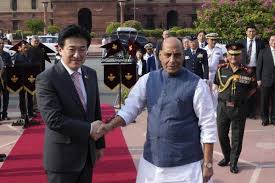
India and Japan Strengthen Indo-Pacific Security Ties Amid Rising Chinese Activity
Introduction
India and Japan, two major players in the Indo-Pacific region, have recently engaged in high-level talks focused on enhancing regional security amidst increasing concerns over China’s growing influence and activities. The discussions mark a significant step in bolstering strategic cooperation between the two nations, reflecting a shared commitment to maintaining stability and countering assertive moves by Beijing.
Table of Contents
Strategic Context: The Indo-Pacific Region
The Indo-Pacific region, encompassing the vast area from the eastern coast of Africa to the western shores of the Americas, is a critical zone for global trade, security, and geopolitical competition. and secure environment.
China’s assertive actions in the South China Sea, its Belt and Road Initiative, and its military modernization have raised concerns among regional and global stakeholders. Both India and Japan view these developments as challenges to the rules-based international order and regional stability, prompting them to deepen their strategic partnership.
Key Areas of Discussion
During their recent talks, India and Japan focused on several key areas to enhance their security cooperation in the Indo-Pacific:
Maritime Security
Given the strategic importance of maritime routes in the Indo-Pacific, maritime security emerged as a central theme in the discussions. Both nations emphasized the need to safeguard freedom of navigation and overflight, particularly in key chokepoints like the South China Sea. They reiterated their commitment to upholding international maritime laws and norms, including the United Nations Convention on the Law of the Sea (UNCLOS).
Defense and Security Cooperation
India and Japan have explored ways to bolster their defense and security collaboration. This includes enhancing joint exercises, sharing intelligence, and increasing interoperability between their armed forces. Such measures are intended to address common security challenges and strengthen their ability to respond to regional threats.
Regional Partnerships and Alliances
The talks also highlighted the importance of building and reinforcing partnerships with other like-minded nations. Both India and Japan are active participants in multilateral frameworks like the Quad (Quadrilateral Security Dialogue), which also includes the United States and Australia. They discussed ways to enhance the Quad’s effectiveness and work with other regional partners to promote a free and open Indo-Pacific.
China’s Reaction and Regional Implications
China has reacted with skepticism to the growing strategic alignment between India and Japan. Beijing views these moves as part of a broader effort by the U.S. and its allies to contain its rise and challenge its interests in the region. China has also expressed concerns about the potential for increased military presence and intervention in its sphere of influence.
The enhanced cooperation between India and Japan is likely to have several regional implications:
- Increased Pressure on China: By strengthening their security ties, India and Japan aim to signal a united front against aggressive behaviors and assertive policies from Beijing. This could contribute to heightened tensions and strategic competition in the Indo-Pacific.
- Strengthened Regional Stability: Conversely, their cooperation could also play a role in stabilizing the region by promoting a rules-based order and providing a counterbalance to unilateral actions. This could help maintain a degree of equilibrium in the face of China’s expanding footprint.
- Influence on Other Nations: The deepened partnership between India and Japan may encourage other countries in the region to reassess their own security strategies and alignments. This could lead to a more diversified and collaborative approach to regional security challenges.
Future Prospects
Looking ahead, India and Japan are expected to continue enhancing their strategic partnership through regular consultations and joint initiatives. Their shared vision for a stable and secure Indo-Pacific region will likely drive further cooperation in various domains, including defense, economic development, and regional diplomacy.
Both nations are also likely to seek to balance their approach by engaging with China diplomatically while strengthening their security posture. This dual strategy aims to manage regional tensions effectively while promoting constructive dialogue and cooperation with Beijing.
Conclusion
The recent talks between India and Japan on Indo-Pacific security underscore a growing alignment between the two countries in response to China’s increasing regional activities. By focusing on maritime security, defense cooperation, and regional partnerships, India and Japan are working to enhance their strategic collaboration and address common security concerns. As they navigate the complexities of the Indo-Pacific, their efforts will play a crucial role in shaping the region’s security dynamics and ensuring a stable and prosperous future.







